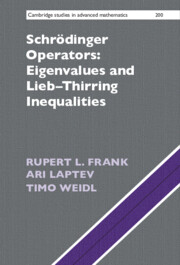Refine search
Actions for selected content:
3 results
Overview
-
- Book:
- Schrödinger Operators: Eigenvalues and Lieb–Thirring Inequalities
- Published online:
- 03 November 2022
- Print publication:
- 17 November 2022, pp 1-4
-
- Chapter
- Export citation

Schrödinger Operators: Eigenvalues and Lieb–Thirring Inequalities
-
- Published online:
- 03 November 2022
- Print publication:
- 17 November 2022
SHARP CONSTANTS BETWEEN EQUIVALENT NORMS IN WEIGHTED LORENTZ SPACES
- Part of
-
- Journal:
- Journal of the Australian Mathematical Society / Volume 88 / Issue 1 / February 2010
- Published online by Cambridge University Press:
- 22 January 2010, pp. 19-27
- Print publication:
- February 2010
-
- Article
-
- You have access
- Export citation
